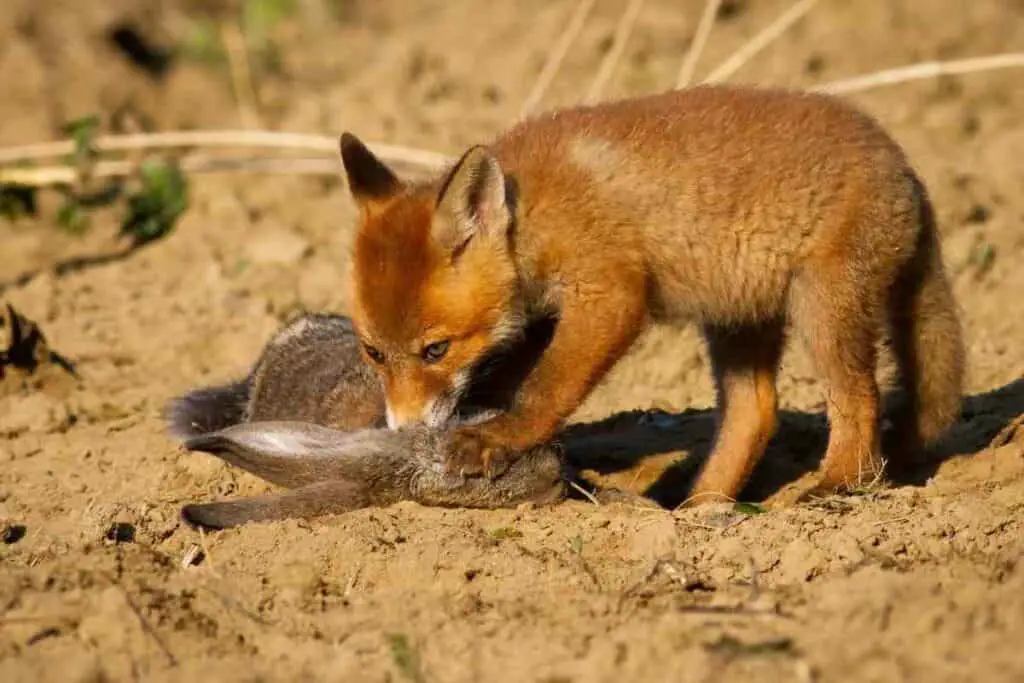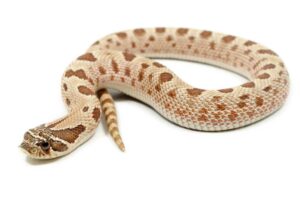Rabbits are extremely fast and have incredible reflexes, acute senses of smell, sight, and hearing, allowing them to react to a potential threat in the smallest amount of time.
It is only natural to wonder if their predators, such as foxes, have a chance against them.
Foxes have an incredibly diverse diet, as they are omnivorous, meaning they can eat anything they can get their paws on. These animals are cunning, tricky, artful, and very clever.
For these reasons, they are very talented predators when hunting.
Since rabbits are small mammals, they are unquestionably on the menu and often are the prey of the sly fox. Even young fox cubs will chase and kill rabbits as soon as they start to mature.

Table of Contents
How Are Foxes Able To Capture Rabbits?
Rabbits have always been popular prey to foxes. But it doesn’t mean they can’t protect themselves. Nature has endowed them with various protection mechanisms to keep them safe from their hunters.
Rabbits have acute senses of sight, smell, and hearing, which aid in their defense against predators. If a predator comes too close, a rabbit may run up to 18 mph and will typically do so in a zigzag pattern to fool its pursuer.
While rabbits have the advantage in speed, foxes have a few smart tricks up their sleeves!
They can successfully stalk their prey; normally they stalk the rabbit stealthily until they get quite near.
The fox will then strike from behind when the rabbit turns to run. Furthermore, the fox is an intelligent animal.
They also calmly wait near rabbit dens for them to emerge, and then it pounces on it and pins it with its paws before delivering the fatal bite.
When cornered, the rabbit resorts to fighting and will use claws, and powerful hind legs to fight off predators and protect itself.
However, they typically don’t stand much of a chance against foxes as they are just too challenging.
Abilities That Enable Foxes Hunt Rabbits
Size
Foxes are the smallest members of the canine family in the wild.
Due to their size, they can move quickly and efficiently over long distances (50 kilometers per hour) while maintaining the stealth and hiding ability of rabbits.
Developed senses
The sense of smell, sight, and hearing of a fox is exceptional, and it relies on these when hunting.
Hearing: The ears of foxes are extremely sensitive to low frequencies. It can detect the squeak of a rabbit from 100 feet away and will dig in the dirt or snow to catch it.
They can notice moving objects quickly but may overlook stationary objects. They can also swivel their ears, which helps them find prey via sound.
Developed sense of smell: They rely on their noses when they can’t see the prey. This ability allows them to detect the scent of prey even when it is hidden.
Excellent vision: Foxes have binocular vision, like many other predators, with both eyes pointing forward. Binocular vision helps the brain to measure distance since each eye views the same world somewhat differently.
A fox can miss a rabbit if it remains still, but it can be detected if it twitches its ear. This is due to the fact that their vision reacts to movement.

Aim
Foxes use a special technique to catch rabbits when close enough. If a rabbit crosses their path, the fox can leap into the air and use its front paws to pin it down – it almost looks like diving.
The fox can change direction in midair by moving its tails if the rabbit moves.
When Do Foxes Hunt Rabbits?
Foxes are very adaptive, and their diet varies according to location and seasonal availability. They eat berries, corn, apples, acorns, cherries, and grasses in the summer.
Ground-grown food is less readily available during winter because much of the plants are dormant or shrouded in ice or snow.
They rely on small mammals such as rabbits, voles, mice and, squirrels throughout winter.
The importance of the hunt during this time cannot be overstated. Despite inclement weather, their supersonic hearing, and an exceptional sense of smell enables them to catch prey.
In the winter, they can hear their prey moving underground or beneath the snow and employ a mix of pouncing and burrowing to get it.
Foxes are mostly nocturnal, meaning they hunt primarily at dawn and dusk. This is because foxes have adapted to their environment and prefer to hunt when they feel safest.
They have a much lower chance of contact with humans or other predators at night.
They stay outside all night, hunting and eating until dawn.
However, if they are hungry, they will come out and hunt at the time of day. Due to their keen sense of smell and sharp eyesight, they can navigate through the darkness to find their wild rabbits easily.
How And Why Do Foxes Like To Eat Rabbits?
Foxes eat a wide variety of foods. While they may consume plants, they are mostly carnivorous, and hence the majority of their diet consists of small animals.
Typically, they love to hunt and focus on smaller animals and prefer animals that are not too dangerous, just like rabbits.

Foxes will use a pouncing technique to pin the rabbit, then use their sharp teeth to deliver a killing blow and strangle by biting them in the throat and then jerking them around.
They will typically break the rabbit’s neck or back or puncture their throat, and decapitation can result from over-enthusiasm.
After having their fill and not finishing a meal in one sitting, they may store the leftover food nearby and return for it later.
Rabbits are a great source of nutrition for foxes as rabbit meat is high in Vitamin B12, Vitamin E, iron, calcium, zinc, phosphorus, and various other vitamins and minerals that they require to remain strong and healthy.
Final Thoughts
One would think of foxes as carnivores, but they are omnivores, which means they eat both animals and vegetation. Due to their adaptations, foxes can successfully stalk rabbits by themselves rather than in large groups.
They hunt mostly at night, making them a nocturnal species.
During the hunt, they remain hidden in the grass with no movement and wait for the rabbit to approach, meaning they have the experience to keep patience when it comes to feeding on rabbits as rabbits have a better speed.










